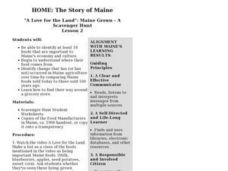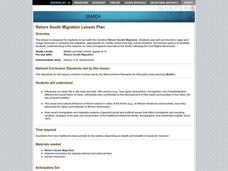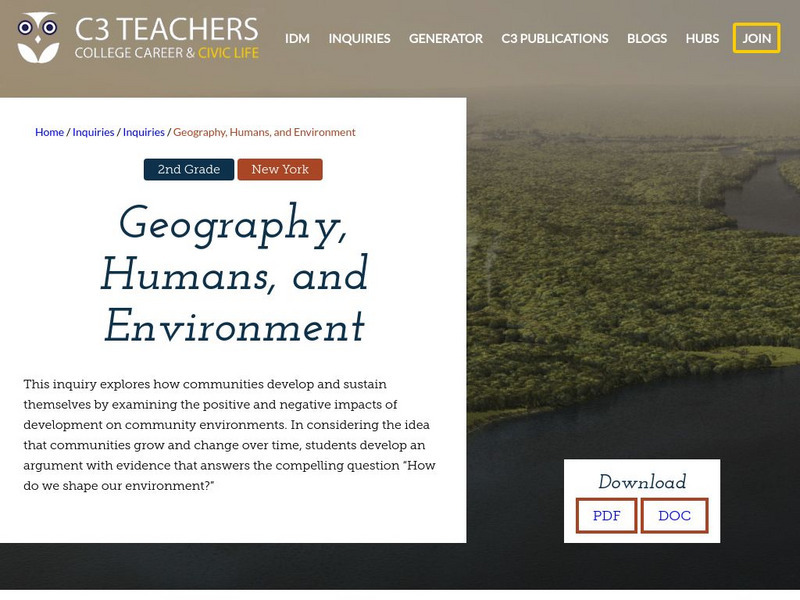Curated OER
The Homestead Act
Eighth graders analyze the Native American's viewpoint of the Homestead Act. Using one Native American group who lived in Nebraska, they write a letter to the editor of a local newspaper discussing the Homestead Act and how it affected...
Curated OER
Happy Birthday Whitehouse
First graders explore the White House and its history through celebrating its birthday. Basic facts are examined and personal experiences related to the exploration of this structure.
Curated OER
Trail of Discovery
Students collaborate on a research-based documentation of their town's founding, written from the point of view of a fictional person who lived there long ago
Curated OER
George Washington Bush: A Settlement Journey
Students, in groups, examine the different aspects of George W. Bush's life that led him to settle in the Camas-Washougal area and eventually homestead in Tumwater, Washington. They write a class biography of George W. Bush.
Curated OER
Why Do You Live Where You Do?
Eighth graders identify reasons why settlers bought land from the railroad and not a Homestead grant. Using that information, they compare and contrast the types of land given in each situation. They discuss the reasons why given...
Curated OER
What Arkansans Contributed to the WW I War Effort
Students examine the Arkansas as home front support during World War I. They determine why the troops who were overseas during the War were important to those at home. They look at the war effort and locate the area of Arkansas were...
Curated OER
Home: The Story of Maine
Students identify at least 10 foods that are important to Maine's economy and culture. They participate in a scavenger hunt as they find their way around a grocery store.
Curated OER
Lake Superior Ecology Unit
Sixth graders research Lake Superior and its ecosystem. Students investigate the lake's cycles of mixing and stratification and how these cycles affect the biology of the lake. This lesson contains five days of activities.
Curated OER
Orca United Nations
Middle schoolers study the differences between sets of data and explain how organisms are adapted to their environment. In this marine mammals lesson students analyze data based on set criteria.
Curated OER
ADULT ESOL LESSON PLAN--Level 2--Transportation and Travel
Students, while reviewing an extensive list of vocabulary terms on the board, examine various transportation costs, schedules and practices. They brainstorm both economical and convenient ways to go from place to place. In addition, they...
Curated OER
Transforming Food Energy: A Balancing Act
Students explain their role as consumers. They use a purchased calorimeter or make their own simple calorimeter to measure the energy content in selected foods. This interesting lesson really gets students thinking about what they eat.
Curated OER
Sentence Game
Students explore and study what they already know about grammar and sentence structure to reinforce their mastery of assessing the eight parts of speech. They match a set of colored word cards with their correct part of speech and create...
Curated OER
Creating and Evaluating Ethnic Advertising
Students examine the concept of ethnic advertising. For this African American history lesson, students watch segments of videos about the history of ethnic advertising. Students respond to questions that correspond to each...
Curated OER
Return South Migration Lesson Plan
Students study the reasons so many immigrants returned to the South following the Civil Rights Movement. They examine how the former slaves influenced the cultural life in the Northern cities.
Curated OER
The Web Of Life - Overlapping Food Chains
Young scholars perform an activity in which they discover what happens when food chains overlap in an ecosystem and discover the three components of a food web.
Curated OER
Go West Young Man#148
Students determine the difference between immigration and emigration. They read and listen to books about emigration westward during the Gold Rush years. They examine life in Gold Rush towns while determining why gold is so valuable....
Curated OER
Breaking News English: Hurricane Dennis Menaces U.S. Coast
In this English learning exercise, students read "Hurricane Dennis Menaces U.S. Coast," and then respond to 1 essay, 47 fill in the blank, 7 short answer, 20 matching, and 8 true or false questions about the selection.
Google
Google Earth Timelapse
See an aerial view of how communities around the globe have changed over time.
ClassFlow
Class Flow: Community Changes
[Free Registration/Login Required] This flipchart discusses basic community changes including changes in population, inventions, and transportation.
Curated OER
National Park Service: Chicago's Black Metropolis: Understanding History Through a Historic Place
Online lesson plan to teach the concept of historical understanding by studying how a community changes over time. In this case, we look at the South Side of Chicago and ask, What happened here? Why did this place change? How am I...
BBC
Bbc History Trail: Local History
How can you trace the history of a community? What are the historical clues and tips you can use to find out what shaped its past? This site explains the techniques historians can use and provides great examples.
CK-12 Foundation
Ck 12: Life Science: Succession
[Free Registration/Login may be required to access all resource tools.] Ecosystems are "dynamic." This means that ecosystems change over time. Both natural forces and human actions cause ecosystems to change. Learn more about succession...
C3 Teachers
C3 Teachers: Inquiries: Geography, Humans, and Environment
A learning module on how humans change and shape their local environment. It includes several supporting questions accompanied by formative tasks and source materials, followed by a summative performance task. Topics covered include...
US Government Publishing Office
Ben's Guide to u.s. Government: Your Neighborhood (3 5)
Elementary site presents a colorful neighborhood. By clicking on the buildings, text appears to explain the services offered by the post office, fire station, police station, home, hospital, school, and library.

























